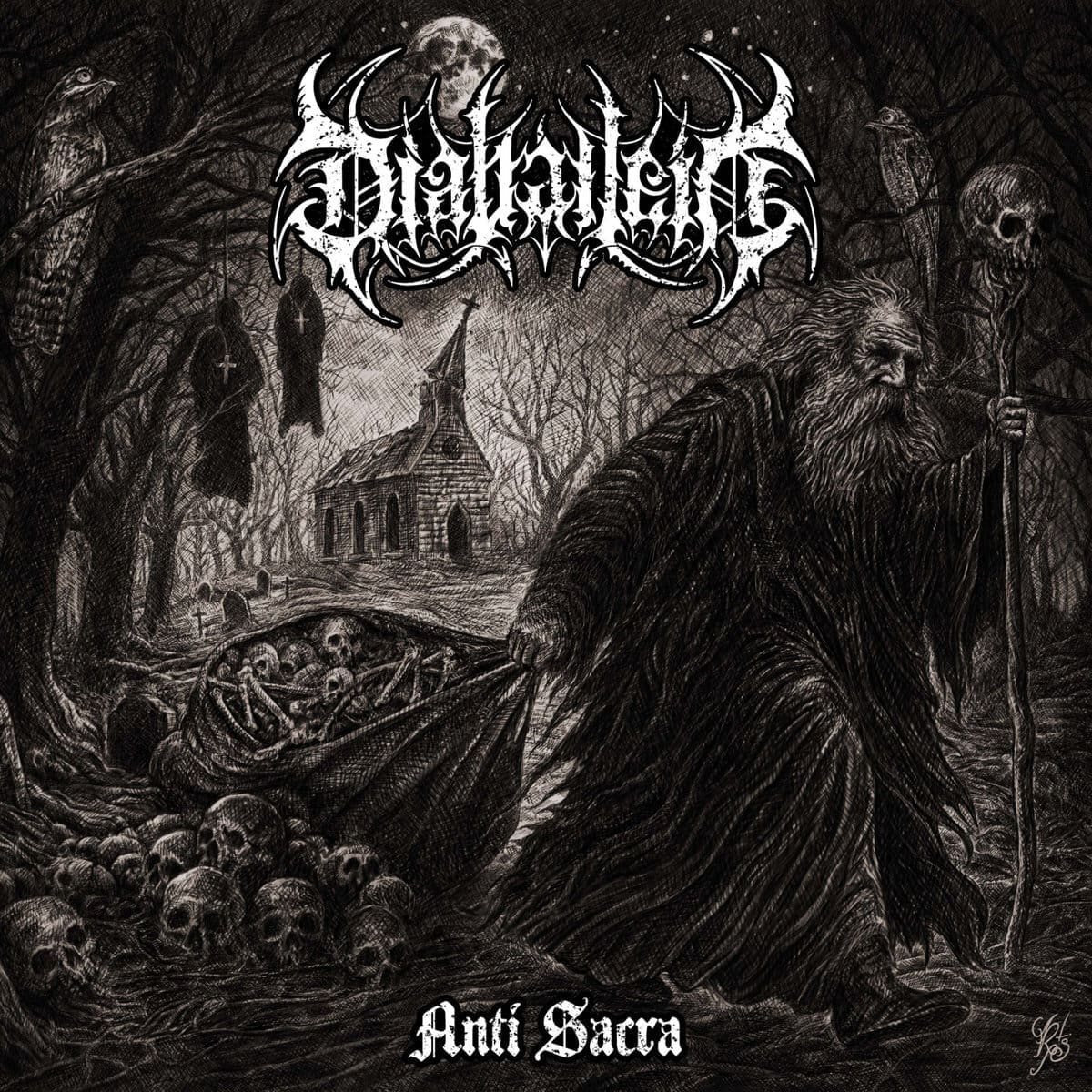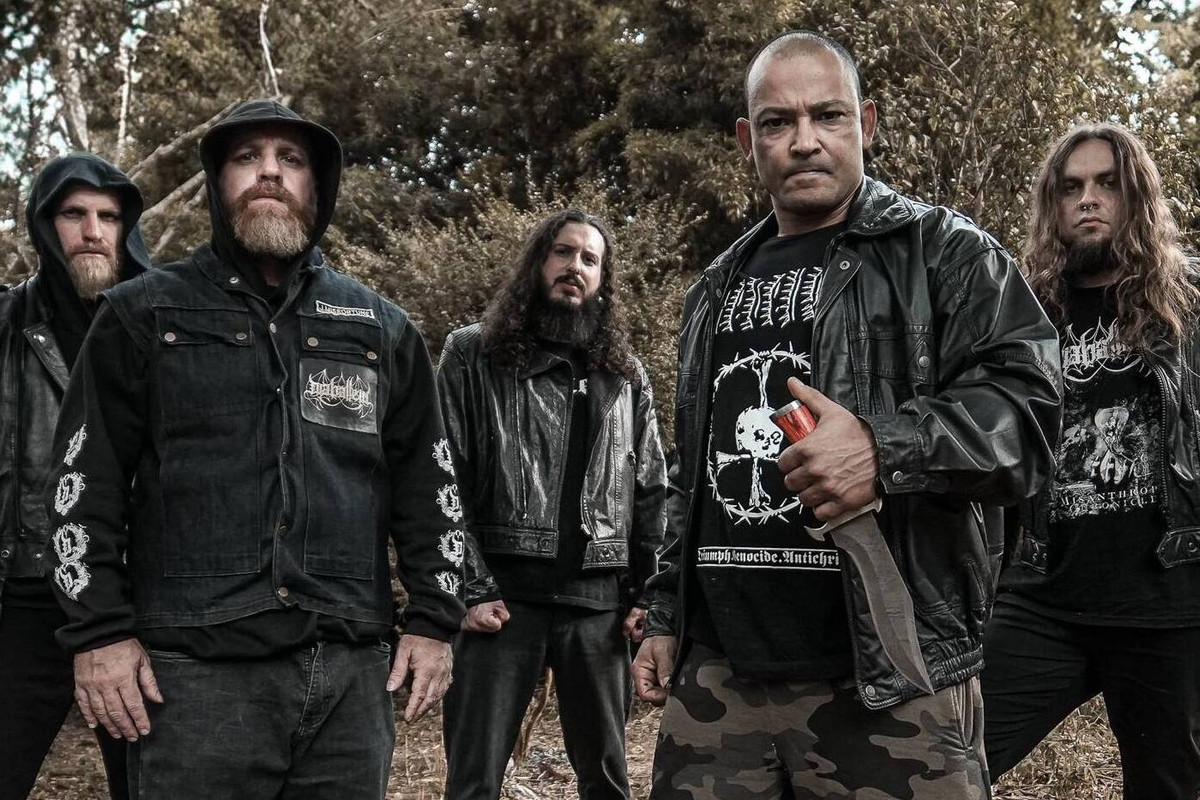Diaballein — Anti Sacra Review
Diaballein, forged in the infernal fires of São Paulo in 2011, Diabállein stands as a herald of blackened wrath. Their third full-length invocation, Anti Sacra, was unleashed upon the devout and the damned on February 21st, 2025—an offering seared onto Nyarlathotep Records’ altar of sonic desecration.
Diaballein, Anti Sacra Review: This review will evaluate every aspect of the album, from its intricate musical composition to its production. Our analysis will provide valuable insights to help you determine if this album is worth adding to your collection.

The First Three Sins, The Summary
The Fourth Sin, Overall Discussion
Aurora’s Whisper: Prelude to the Sacred
As soon as the listener presses play, Aurora, the opening hymn, doesn’t erupt in chaos but instead unveils itself with delicate restraint, immediately gripping the listener’s senses. The soundscape that unfolds is not merely an introduction — it’s a summons, a call to step into a realm just beyond ordinary perception.
The initial notes hover as if holding their breath, awaiting ignition. It feels as though the music itself is building tension, coaxing the listener into the sacred space where transformation begins — like the moment just before a ritual starts, when everything is still, silent, charged with unseen power.
Cathedral Blasphemy: Sigils, Thunder, Fallen Sermon
As Anti Sacra progresses, the ritual intensifies. The remaining six hymns form a cathedral of inversion, each note dismantling the sanctity of traditional worship. Every track drives a nail into the coffin of old beliefs, shattering the divine facade with brutal precision. This is not merely black metal; it is a full-blown liturgical conflagration, incinerating dogma through sheer, unfiltered force.
Guitars carve riffs like sinister sigils — sharp, deliberate symbols of defiance. The drums shake the core like divine thunder, pounding with the relentless power of a wrathful god. Beneath it all, the bass rumbles like the last sermon of a fallen priest — heavy and ominous.
Diaballein’s vocals channel a voice that no longer serves the divine — a mouthpiece for forbidden ideas.
Raw Recording & Echoes Through the Void
Diaballein’s recording captures this violence with stark clarity. It isn’t lo-fi for aesthetic’s sake, but deliberately raw — preserving the visceral energy that renders the album alive and dangerous. Each instrument is given space to bleed, to scream, to fracture, yet everything remains sharply cohesive. The sound is oppressive, crafted to envelop the listener in a heavy, ritualistic atmosphere.
Diaballein’s production boasts a dynamic range that complements the pacing perfectly. At times, passages feel cavernous and vast, as if echoing through a cathedral stripped of hope. These moments lend weight to the ritualistic aura. When the music surges with blast-heavy bursts, it strikes with the force of spiritual artillery — chaos unleashed with purpose.
This balance ensures the music never descends into meaningless noise, instead functioning as a weapon—both destructive and sanctified
Anchoring the Abyss: Alastor’s Sermon Beneath
Diaballein’s devilmanship yields formidable fruit of artistry. Jean Misfortune (lead guitar) and Caio Caraski (rhythm) deliver a dual assault of tremolo-picked riffs, dissonant chords, and the occasional solo. These solos slice through the chaos like ritual daggers — deliberate, sharp, and unsettling. The tone is razor-sharp and infernal, rivalling bands like Marduk and Dark Funeral, but with a twist.
There’s more variation here — fluctuations in tempo and phrasing that keep the listener on edge, never settling into predictable chaos. It’s a game of controlled aggression, every riff and passage crafted to serve the ritual’s purpose. Maicon Menezes’ bass is thick and commanding, never overshadowed but always vital. It grounds the entire rite, especially in slower sections where its menace deepens.
It’s not just following the guitar—it’s anchoring the ceremony, adding dread and weight

The Temple Shakes: Phobos’ Percussive Fury
Ivan Phobos’ percussion exemplifies brutality woven into art. His blast beats and double-kick flurries drive the chaos, while strategic tempo shifts evoke spiritual phases — moments of tension yielding to cathartic devastation. His performance balances violence with ritual, each rhythm a vital part of the sacred invocation.
The drum sound itself is crisp yet organic, retaining its raw aggression without sterility. Every hit feels intentional, every strike anchoring the rite. It’s as if the drums are sacred instruments, announcing the start of a dark ceremony.
Preacher of the Void: Voxum’s Infernal Sermons
Octávius Voxum’s vocals are equally commanding — guttural roars, infernal snarls, and recited passages echo like sermons from the void. His theatrical delivery lures the listener into spiritual battle, particularly on “Eternal Vortex,” where spoken segments deepen the ominous atmosphere. Voxum’s manifestos reject institutional religion, dismantling myth to forge personal liberation through chaos.
Diaballein’s lyrics are poetic, provocative, and soaked in occult symbolism — crafted to challenge, to evoke, to disturb.
Final Litany: AntiSacra’s Ceremonial Rebellion
The title track inverts sanctity itself, flipping the divine to expose its fractures. Wisdom and Solitude closes the album with raw, introspective brutality — an ending that feels like a final blow or personal confession. Every element, from artwork to production, reinforces the central theme of defiance. The visual art echoes chaos, inversion, and anti-dogma, amplifying the music’s essence.
Anti Sacra isn’t just an album — it’s a ceremonial invocation. A forbidden fruit of art: seductive, dangerous, and ultimately rebellious.
Closing: From Sanctum to Ash: The Final Descent Begins
As the final hymns fade and the ritual nears its end, we offer our gratitude to Alessandro of Coldwinter for unsealing the gate to Diaballein and their unholy offering, Anti Sacra. With this invocation complete, we now descend into the final three sins—the last rites of our ceremonial review.
The Fifth Sin, The Memorabilia
For me, Diaballein’s Anti Sacra strikes every mark—it’s more than black metal; it’s invocation. Raw, old-school at heart, yet streaked with modern malevolence. That vintage charm runs deep, but Diabállein’s devilmanship feels uniquely theirs. The sound, the structure, the flame—they’re not tracing outlines; they’re casting their own. There are echoes, perhaps, of spiritual lineage—Marduk’s fervour, Mayhem’s lunacy, Darkthrone’s frostbitten posture, Revenge’s militant nihilism—but only as embers in a wholly sovereign fire.
The Sixth Sin, The Artwork
Diaballein’s artwork is a visual invocation: grotesque, sacred, inverted. The imagery bleeds ritual—sigils and shadows forming a canvas of anti-sanctity. It amplifies the sound, deepens the wound, and binds the aesthetic to the curse.
The Seventh Sin, Disrelish
There is no disrelish to be found in Diaballein’s Anti Sacra—only fire, fury, and devotion cast in sonic form. With this final invocation, our review reaches its end. We extend sincere thanks for walking this path with us, and we invite you to delve deeper into the offerings of Coldwinter and Diaballein. Their works are more than music; they are rites waiting to be witnessed.
The Hymns
01. Aurora
02. Incipit Tragoedia
03. Eternal Vortex
04. Deteriorated by Time (Dust)
05. Anti Sacra
06. Burn the Morals and Dogma
07. Wisdom and Solitude
Diaballein
Octavius Voxum — Vocals
Jean Misfortune — Gruitars
Caio Caraski — Guitars
Maicon Menezes — Bass
Ivan Phobos — Drums